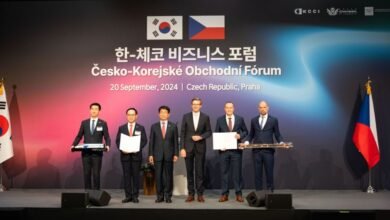Doosan to invest in Next-Generation energy business
Doosan Fuel Cell plans to enter the SOFC market for power generation in 2024 and SOFC for ships in 2025 sequentially.

The Doosan Group will revitalise Korea’s energy industry ecosystem, including nuclear power plants, by actively investing in next-generation energy businesses such as small modular reactors (SMRs), gas turbines, and hydrogen fuel cells.
Doosan announced on 25th May that it planned to invest KRW 5 trillion in energy fields such as SMRs, gas turbines, hydrogen turbines, and hydrogen fuel cells over the next five years.
In particular, Doosan plans to focus on the development of SMRs-which have emerged as one of the pillars of the Korea-U.S. economic and security alliance-and semiconductors and batteries following US President Joe Biden’s visit to Korea. SMRs are next-generation nuclear power plants featuring dramatically improved safety, economy, and operability. In 2020, US-based NuScale became the only company to acquire standard design certification from the US Nuclear Regulatory Commission (NRC).
The gas turbine and hydrogen turbine businesses are also major investment targets for Doosan. Doosan Enerbility is installing a 270MW-class gas turbine-which was successfully developed by the company for the fifth time in the world in 2019-at the Gimpo Combined Heat and Power Plant and is planning to test-operate it beginning next year. Currently, the company is concentrating on the development of an upgraded 380MW-class gas turbine and new investment in the development of hydrogen turbines. The localisation rate of parts for gas and hydrogen turbines exceeds 90%, and the investment is expected to help about 340 domestic suppliers.
Investments in the hydrogen business aim to build a lineup of hydrogen fuel cell products. Doosan Fuel Cell started the construction of a 50MW-class solid oxide fuel cell (SOFC) plant in the Saemangeum Industrial Complex in April to mass-produce SOFC products. Solid oxide fuel cells utilise the movement of electrons and generate electricity in a few basic steps. The plant’s construction is scheduled to be completed with mass production to commence by 2023.
At the same time, Doosan plans to invest actively in new businesses. In addition to future growth engines such as cooperative robots and hydrogen drones, the company plans to contribute to revitalising related industrial ecosystems by increasing investment in expansion to new businesses such as high-tech materials for drug storage and 5G antenna materials that are expected to grow.
